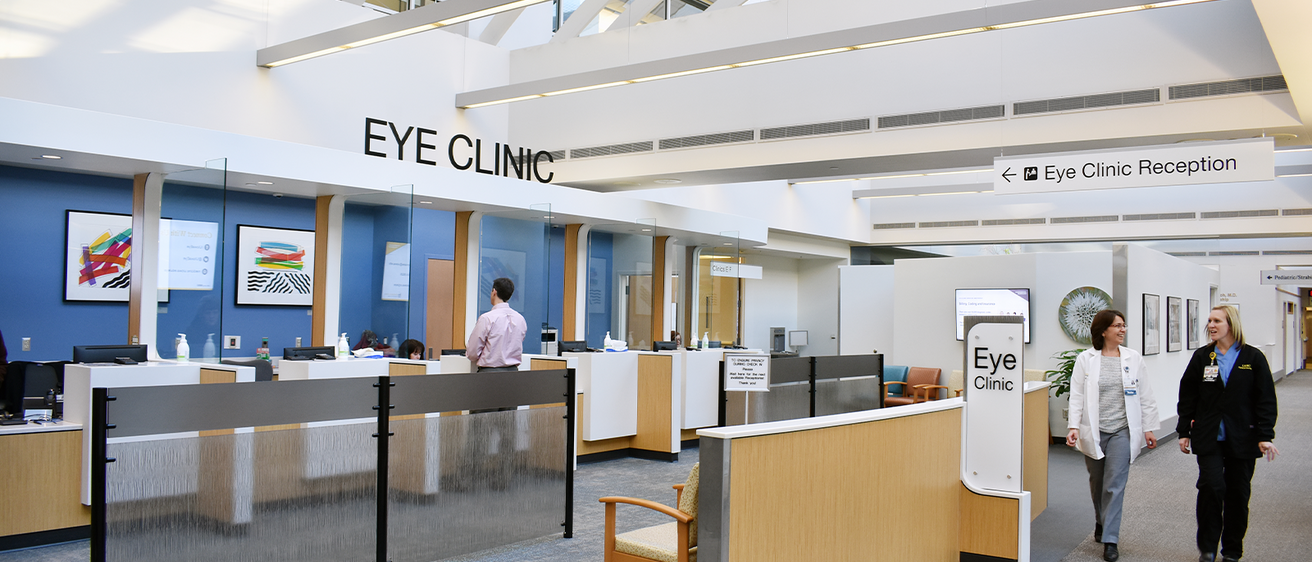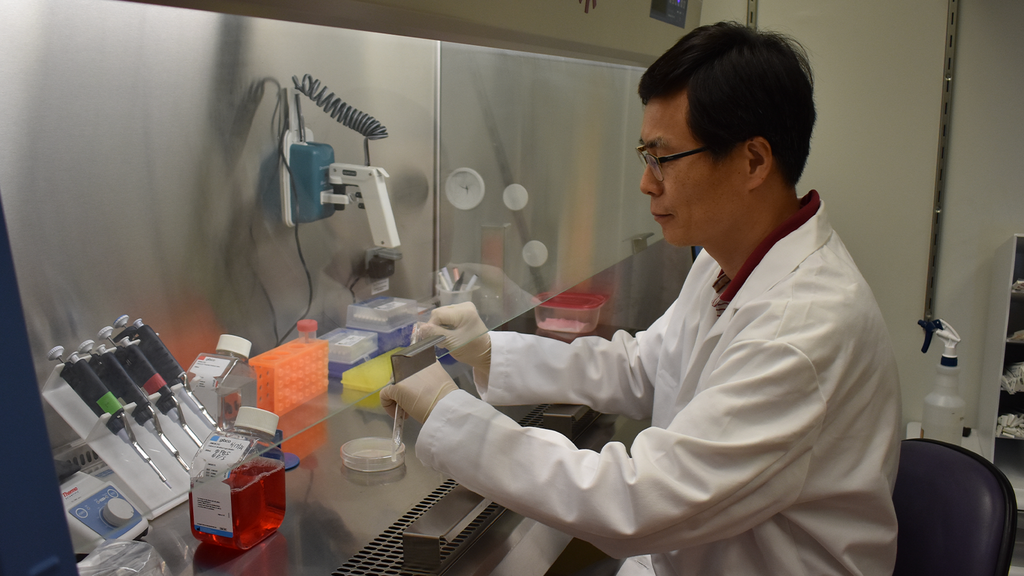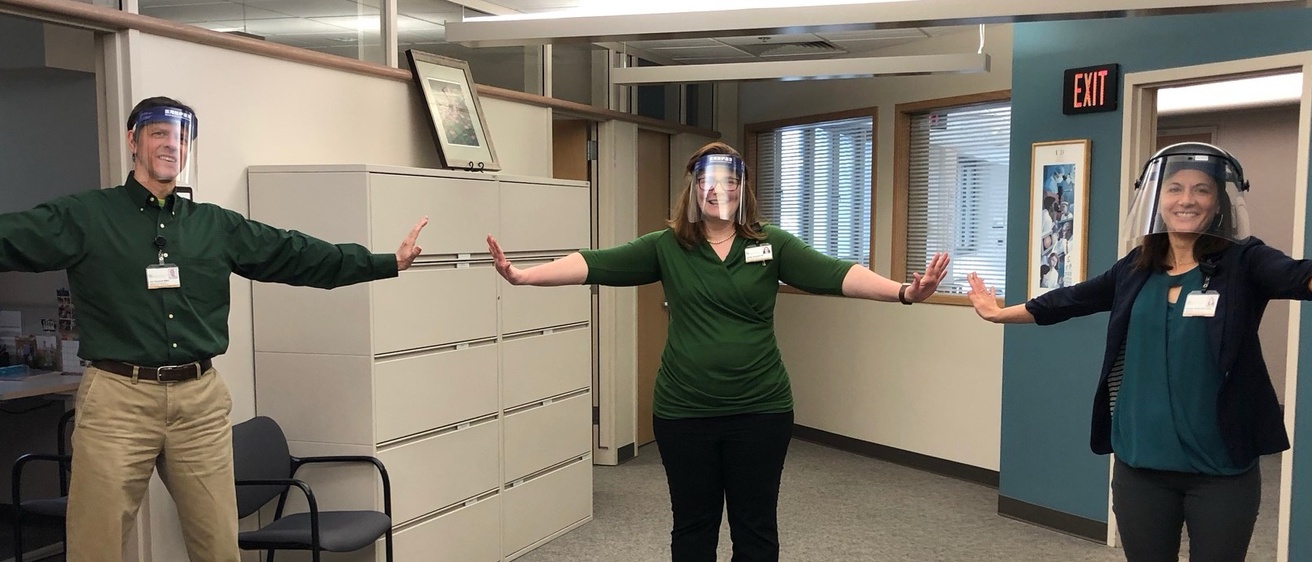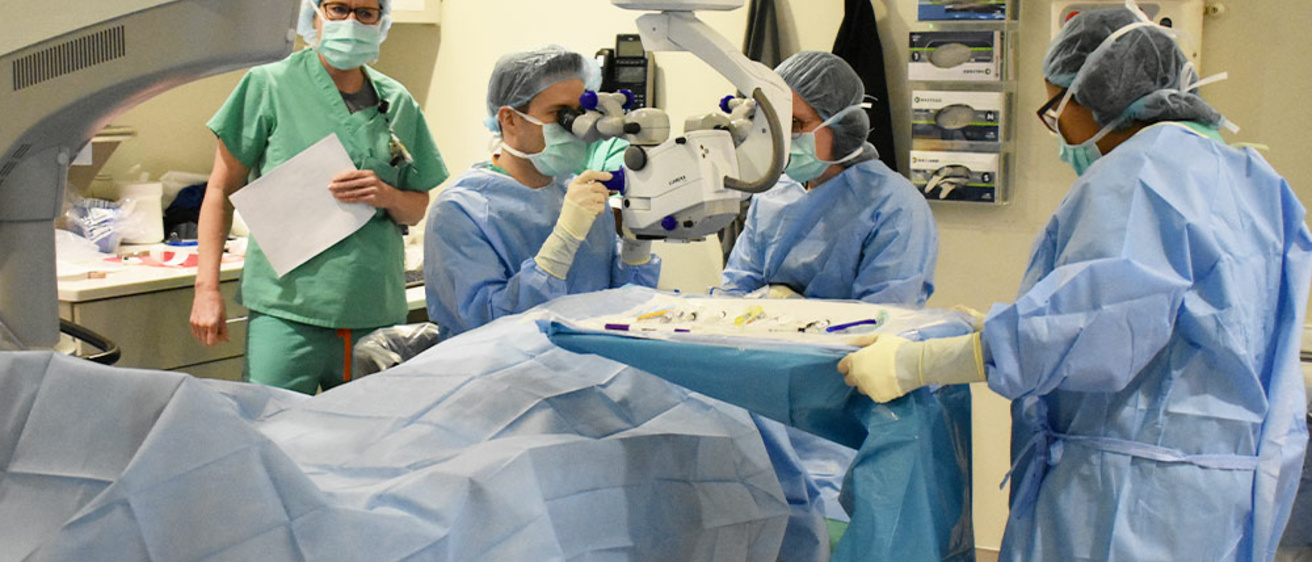Main navigation
Since 2015, the University of Iowa Department of Ophthalmology and Visual Sciences has made significant strides in patient care, research, and global outreach. The department has expanded its Vision Rehabilitation Clinic, introduced innovative technologies like prosthetic scleral lenses, and partnered with clinics to increase accessibility to eye care. Research highlights include advancements in low vision technologies, neuro-ophthalmology, and stem cell therapy for age-related macular degeneration. Philanthropy has supported continuing education and international medical missions. The department has celebrated faculty achievements, engaged the community through events, and is preparing for its 100th anniversary in 2025. Looking ahead, the department aims to enhance its global outreach and leverage AI for improved patient outcomes.
Revolutionizing Patient Care
"There is a whole range of exciting new technologies that can greatly enhance a patient’s quality of life." —Dr. Mark Wilkinson
The department’s unwavering commitment to improving vision health has led to significant advancements in patient care. One of the most impactful developments has been the expansion of the Vision Rehabilitation Clinic, which has helped countless individuals adapt to vision loss. The introduction of new optical and electronic magnification devices, computer enhancements, and smartphone apps has empowered patients to maintain an active lifestyle. Dr. Mark Wilkinson, OD, emphasized, "There is a whole range of exciting new technologies that can greatly enhance a patient’s quality of life."
The expansion of eye care services to eastern Iowa was also a game-changer. The department partnered with the Midwest Vision Clinic of Clinton and Mercy Medical Center–Clinton, increasing accessibility to high-quality eye care. Additionally, the introduction of prosthetic scleral lenses, developed by Dr. Christine Sindt, OD, FAAO, has offered solutions for individuals with corneal diseases and irregularities. These custom-made lenses, designed using EyePrintPRO™ technology, ensure an unprecedented level of comfort and vision correction.
Cutting-Edge Research and Innovation
The University of Iowa has long been a hub for innovative research in ophthalmology. Dr. Mark Wilkinson, OD, played a crucial role in raising awareness about low vision technologies as part of the National Eye Institute’s Low Vision Committee. His contributions to the Living with Low Vision resource have provided essential guidance to patients navigating life with impaired vision. Wilkinson’s message is clear: "Encouraging patients to seek help from low vision specialists is crucial for improving their quality of life."
In the field of neuro-ophthalmology, Dr. Enrique Rivera, MD, was awarded the NANOS Best Paper by Fellow Award for his groundbreaking research on chronic optic neuropathy. His study, conducted alongside renowned colleagues, provided invaluable insights into retinal and optic nerve blood flow, paving the way for a better understanding of neuro-ophthalmic disorders.
Perhaps one of the most exciting areas of research has been stem cell therapy. Dr. Budd Tucker, PhD, led pioneering studies on regenerative medicine for age-related macular degeneration. His innovative work on producing retinal cell grafts from fibroblasts offered new hope for restoring vision. His research has earned prestigious recognition, including the Research to Prevent Blindness/International Retinal Research Foundation Catalyst Award for Stem Cell Research Approaches.
Research at Iowa Today
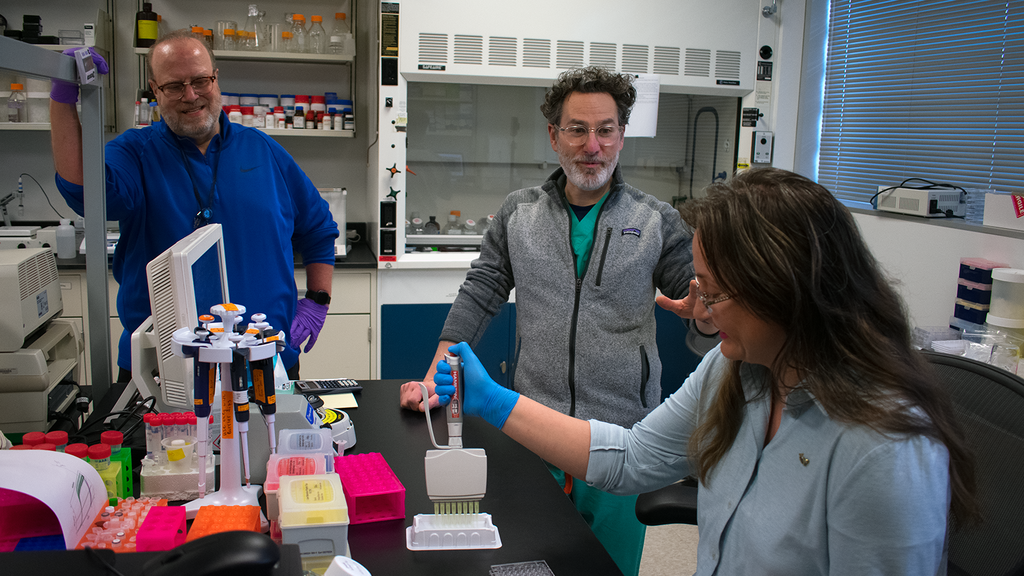
Dr. Mark Greiner’s Groundbreaking Research on Ubiquinol and Corneal Health
Vision in the Time of Crisis: How the University of Iowa’s Ophthalmology Department Navigated the COVID-19 Pandemic
When the COVID-19 pandemic swept across the world, the University of Iowa’s Department of Ophthalmology and Visual Sciences faced an unprecedented challenge. As one of the leading eye care centers in the nation, the department had to rapidly adapt to ensure continued patient care, medical education, and research, all while safeguarding the health of staff, trainees, and patients.
A New Reality in Eye Care
“Given the current health crisis with COVID-19, I felt that everyone took great care to protect patients and make me feel safe.” – UI Patient
Ophthalmology is a specialty that depends on in-person interactions—eye exams, surgical procedures, and direct patient engagement are at its core. However, with the onset of COVID-19, the department had to reimagine its operations. Safety protocols were overhauled with strict infection control measures, mandatory personal protective equipment (PPE), and social distancing requirements.
One of the biggest hurdles was navigating restrictions on elective surgeries and routine eye care appointments. Ophthalmologists had to prioritize urgent and emergent cases while postponing non-essential procedures. This required a meticulous triage system to ensure that patients with conditions such as retinal detachments, glaucoma progression, or corneal infections received immediate attention while others were rescheduled.
Despite these challenges, the department continued to provide exceptional patient care. One patient noted in a Press-Ganey survey, “Given the current health crisis with COVID-19, I felt that everyone took great care to protect patients and make me feel safe.”
Embracing Telemedicine
A silver lining of the pandemic was the accelerated adoption of telemedicine. The University of Iowa’s ophthalmology team quickly expanded its virtual care services, allowing doctors to conduct remote consultations for follow-ups and preliminary assessments. While certain eye conditions still required in-person evaluations, telehealth became a vital tool for managing chronic diseases and post-operative care.
Dr. Christine Sindt, Director of the Contact Lens Service, praised the department’s ability to adapt, stating, “I love that while our faculty are all pursuing academic and research excellence, our main focus is patient care… I believe our patients and our faculty benefit from our group approach, and it allows me to focus on the subspecialty I love best.”
This shift in care delivery was particularly beneficial for vulnerable populations. Pediatric ophthalmologists, for example, leveraged telehealth to screen children for conditions such as amblyopia using a web-based vision test developed in collaboration with the University of Utah.
Vaccine Rollout and Staff Safety
As the pandemic evolved, the department took an active role in the institution-wide COVID-19 vaccine rollout. Faculty and staff were vaccinated in phases, ensuring that frontline workers received protection as early as possible. The department worked closely with UI Health Care leadership to keep employees informed about vaccination schedules, eligibility, and safety measures.
Denise Rettig, a key coordinator of the vaccine efforts, reassured employees, “We have been able to get many of our faculty and staff scheduled for their first dose. Everyone will get the opportunity for the vaccine. This is being done in a phased process.”
The rollout proceeded efficiently, helping to alleviate concerns and restore a sense of security within the department.
Medical Education and Research Persevere
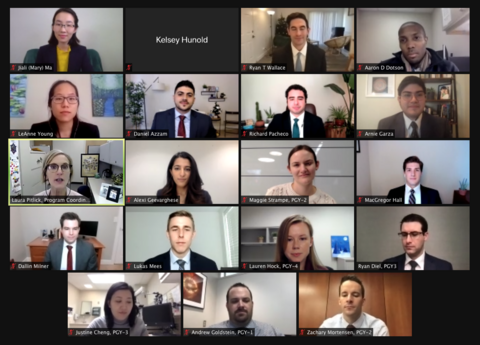
The University of Iowa has long been a leader in ophthalmic education, and the pandemic tested its ability to maintain that standard. Traditional morning rounds transitioned to virtual platforms, allowing faculty, residents, and fellows to continue discussing clinical cases safely. Despite the shift, the commitment to excellence remained unwavering.
Faculty members also continued groundbreaking research, adapting to laboratory shutdowns and restrictions on clinical trials. The Iowa KidSight program, which screens children for vision problems, successfully adapted to pandemic conditions, screening over 18,000 children in 2020 despite the challenges.
Lori Short, an Iowa KidSight representative, highlighted the program’s resilience:
“Possible vision problems were detected in 914 Iowa children in 2020. That’s an average of 17 children per week requiring referral to an eye doctor. The total number of children safely screened in 2020 totaled 18,606. That’s an incredibly productive year during a global pandemic.”
Additionally, research efforts at the Center for the Prevention and Treatment of Visual Loss, located at the Iowa City V.A. Hospital, continued advancing telemedicine initiatives and diagnostic innovations. Director Dr. Randy Kardon emphasized the importance of the work, saying, “We recognize the sacrifice that veterans have provided through their dedicated service and remain focused on developing innovative diagnostic and treatment options for their vision loss.”
Resilience and the Road Ahead
Through it all, the University of Iowa’s Department of Ophthalmology and Visual Sciences demonstrated resilience, innovation, and a steadfast commitment to patient care. While the pandemic presented obstacles, it also reinforced the department’s ability to evolve in response to crisis.
As the world moved beyond the pandemic, the lessons learned—embracing telemedicine, prioritizing safety, and maintaining educational excellence—continue to shape the future of ophthalmology at Iowa. The department’s ability to adapt during one of the most challenging times in modern medicine is a testament to its leadership and dedication to preserving vision, no matter the circumstances.
Impact Through Philanthropy and Global Outreach
Beyond research and patient care, the department also made a significant impact through philanthropy. New funds such as the Sarah Smith, RN, Ophthalmic Education Fund and the Stacy L. Thompson Resident Award were established to support continuing education for ophthalmic nurses, technicians, and physicians.
On a global scale, the department extended its expertise to underserved regions. Dr. Robin Ross, MD, and Dr. Chad Cleveringa founded the Robin Ross and Chad Cleveringa Ophthalmology Residency Support Fund, which provided funding for international medical missions. Their efforts helped train ophthalmologists worldwide, ensuring that patients in underserved areas receive much-needed eye care. Reflecting on his experience, Dr. Ross shared:
"The University of Iowa residency program was transformative and altered my career to give me the skills necessary to work on the pressing challenges of ophthalmology care in underserved areas."
Generous donations established new funds and endowed positions, such as the Rodolfo N. Perez, Jr., MD and Margaret Perez Professorship in Ophthalmology Education, which supports resident training and education. The department has also received substantial support from organizations like the Bechtel Trusts and the Wolfe Foundation, which have funded resident education and equipment. Community outreach initiatives, such as the Iowa KidSight program, have provided free vision screenings to thousands of children across Iowa, identifying and addressing vision problems early. These philanthropic efforts and community programs enhanced the department's ability to provide top-tier education, conduct groundbreaking research, and deliver exceptional patient care.
For years, a patient at the Iowa City Free Medical and Dental Clinic found joy in making pupusas—a traditional El Salvadorian dish—for her family and friends. However, cataracts eventually impaired her vision, making cooking difficult. In August 2022, she became one of the first clinic patients to benefit from cataract surgery. “It was a touching moment when she could see again for the first time in a long time,” says Andrew Pouw, an ophthalmologist and UI clinical assistant professor. “There were many tears. That’s why our resident volunteers do this.” Grateful, she brought a cooler of pupusas to the clinic to thank the volunteers for helping her return to the cooking she loves.
Identifying and Addressing Barriers
University of Iowa ophthalmology residents, who volunteer at the clinic, often saw low-income, uninsured patients whose vision could be restored with proper treatment. Despite their desire to help, the cost of vision-restoring procedures limited them to diagnosing patients and prescribing eyeglasses or eye drops. To address local healthcare barriers, resident volunteers identified cataracts and diabetic retinopathy as common causes of major vision loss that they could treat at the clinic. “These diseases affect our patients more severely because they lack access to care,” says Pouw. “They can be permanently blinding.”
Securing Resources and Expanding Services
Over the past two years, the resident volunteers secured a $100,000 grant from the UI Carver College of Medicine to purchase equipment for diagnosing and treating eye diseases. They collaborated with UI Health Care leadership to schedule cataract surgeries at the Iowa River Landing facility twice a year. With portable equipment, they can perform laser treatments for diabetic retinopathy at the clinic every other month. The resident volunteers have already helped dozens of patients regain their sight and continue to seek ways to expand their reach.
Future Plans and Volunteer Efforts
The team plans to offer more treatments for other eye diseases, raise awareness of the program among Iowa optometrists, and find additional funding to maintain equipment, expand services, and manage cataract surgery costs. Sean Rodriguez, a resident volunteer leading the effort, is encouraged by the participation of over 50 volunteers—from ophthalmology and anesthesia faculty, fellows, and residents to medical students—in Operation HawkEyeSight. “Involvement in this program keeps us focused on what’s important: patient care, regardless of cost,” he says.
*from an article written in 2023
Engaging the Community
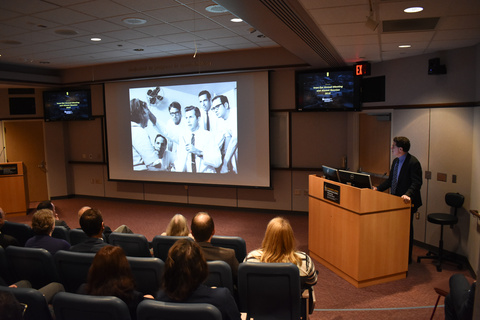
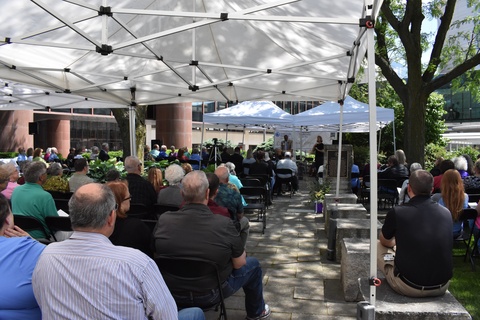
The University of Iowa Department of Ophthalmology remains deeply connected to its alumni and the broader ophthalmology community through various events. The Iowa Eye Annual Meeting continues to be a premier event, bringing together faculty, trainees, and distinguished speakers to discuss the latest advancements in the field. The 2018 meeting honored Dr. H. Stanley Thompson, MD, with guest speakers including Dr. David Tse and Dr. Kathleen Digre.
In addition, the Iowa Lions Eye Bank hosts an annual Dedication Ceremony at the Iowa Lions Donor Memorial & Healing Garden, recognizing the contributions of donors and volunteers. Marking milestones such as the 10th anniversary of the garden and the 60th anniversary of the eye bank, these ceremonies underscore the profound impact of cornea donations in transforming lives.
Global Eye Care and Philanthropy at Iowa Today
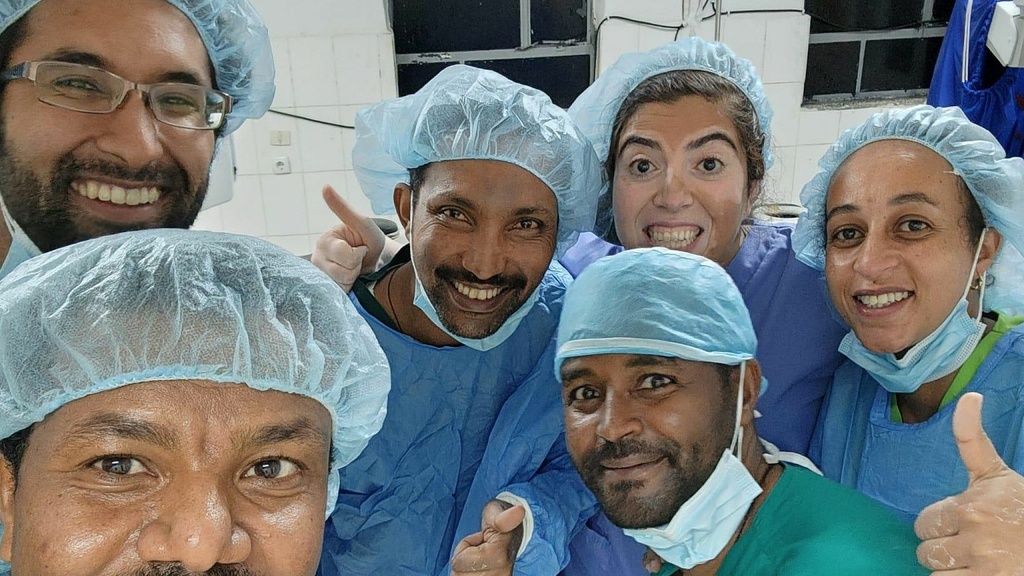
Continuing Iowa’s Global Work: Kanwal Singh Matharu, MD
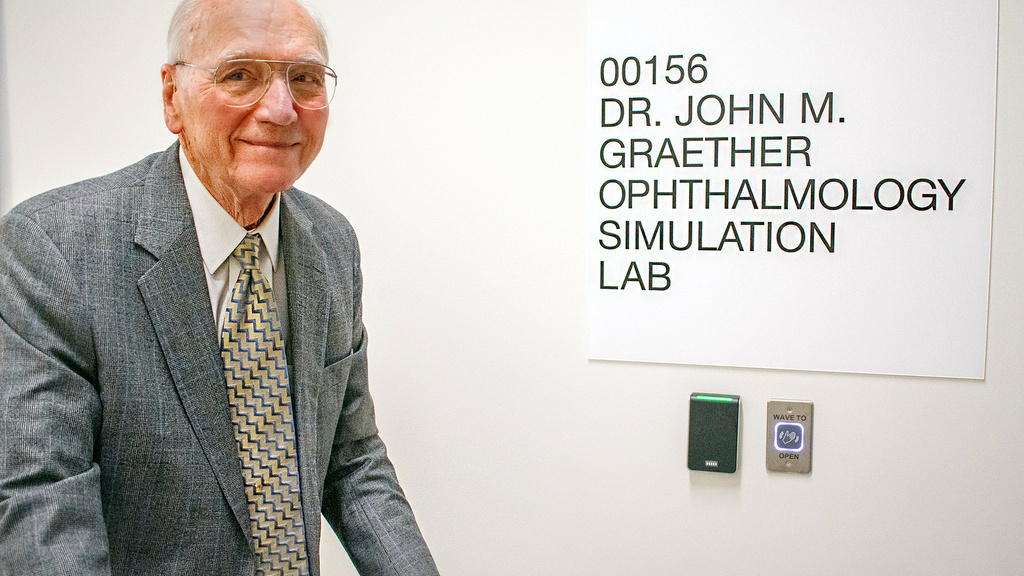
New Dr. John M. Graether Ophthalmology Simulation Lab Is Up and Running
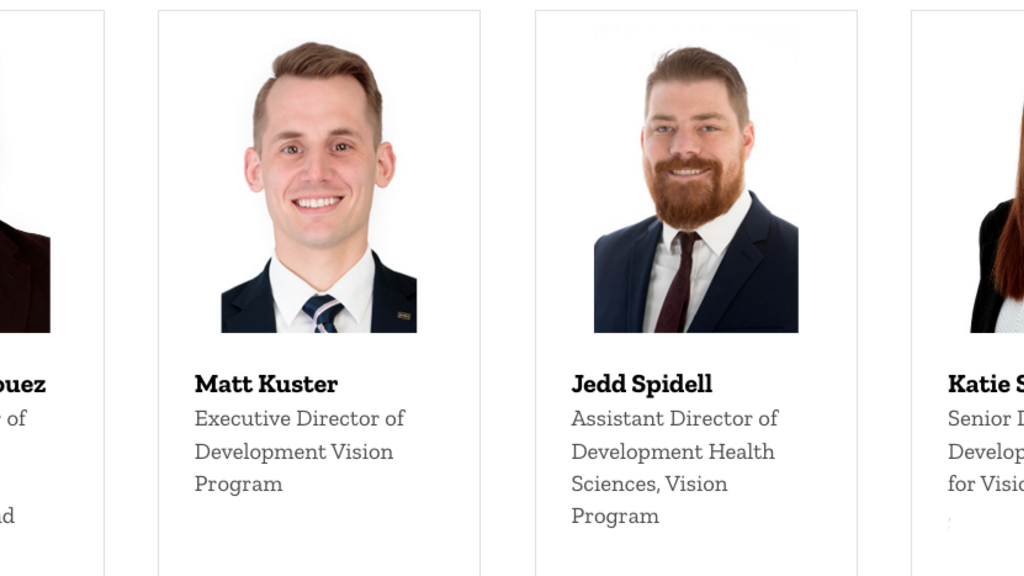
Support Us
Faculty Achievements 2015-2024
2015
Dr. Mark Greiner
- Awarded the 2015 Troutman Cornea Prize for Young Clinician Investigators by the Cornea Society for his outstanding and innovative paper published in Cornea.
Dr. Budd Tucker
- Received one of three Research to Prevent Blindness/International Retinal Research Foundation Catalyst Awards for Stem Cell Research Approaches for Age-Related Macular Degeneration. This award is designed to fund high-risk/high-gain vision research.
2016
Dr. Michael Abràmoff
- Study published in PNAS journal on retinal neurodegeneration in diabetes mellitus
Dr. Lee Alward
- Received the American Glaucoma Society Outstanding Educator Award
Dr. Arlene Drack
- Received the Outstanding Mentor in Translational Research Award
Dr. Mark Greiner
- Received the Frolics Award for M3 Junior Faculty of the Year
- Named in the Top 100 Power List 2016 for most influential people in ophthalmology
- Recognized with the "You Make a Difference" award
Dr. Rob Mullins
- Named Fellow of the ARVO
Dr. Stephen Russell
- Named Fellow of the ARVO
Dr. Christine Sindt
- Received FDA approval for the EyePrintPRO scleral lens design
Dr. Ed Stone
- Named in the Top 100 Power List 2016 for most influential people in ophthalmology
2017
Dr. Michael D. Abràmoff
- Founded IDx, LLC, a diagnostic algorithm company.
- Joined IBM Watson Health Medical Imaging Collaborative.
Dr. Lee Alward
- Gave the 27th American Glaucoma Society Lecture.
Dr. H. Culver Boldt
- Selected as the 2017 Clinician of the Year by the University of Iowa Physicians (UIP).
Dr. Keith Carter
- Received the Commitment to Advocacy Award from the American Academy of Ophthalmology (AAO).
- President-elect of AAO.
- 2017 President of Association of University Professors of Ophthalmology.
Dr. Arlene Drack
- Honored as the 33rd Roger Johnson Lecturer at Seattle Children’s Hospital.
Dr. James Folk
- Elected President of the Macula Society.
Dr. Thomas Oetting
- Received the President and Provost Award for Teaching Excellence.
- Awarded the Carver College of Medicine Faculty Service Award.
- Presented at the Houston Ophthalmology Society as the 51st Everett Goar lecturer.
Dr. Erin Shriver
- Selected for AAO’s Leadership Class of 2017.
- Vice President-Professional Education for Iowa Academy of Ophthalmology.
- Selected for Board of Directors of American Association for Pediatric Ophthalmology and Strabismus.
- Elected President-elect of Iowa Academy of Ophthalmology.
Dr. Elliott Sohn
- Named one of the world's Top 50 "Rising Stars" in Ophthalmology by The Ophthalmologist publication.
Dr. Ed Stone
- Awarded The Board of Regents Award for Faculty Excellence.
Dr. Christine Sindt
- Received the Dr. Gertrude Stanton Award for Innovation at the American Academy of Optometry meeting.
2018
Dr. Michael Abramoff
- Presented at the first Tele-Ophthalmology and Artificial Intelligence Conference.
- IDx-DR achieved endpoints in a pivotal FDA trial.
- IDx-DR received FDA authorization for marketing.
Dr. Lee Alward
- Presented the Goldmann Lecture at the Glaucoma Research Society meeting.
Dr. Arlene Drack
- Received the Women in Ophthalmology 2018 Scientific Contribution Award.
Dr. Keith Carter
- Featured in two articles by the American Academy of Ophthalmology.
- Received a new gavel as President of the American Academy of Ophthalmology.
Dr. John Fingert
- Elected as a member of the Glaucoma Research Society.
Dr. Mark Greiner
- Elected as a member of the Eye Bank Association of America board of directors.
- Co-recipient of the David Sackett Trial of the Year Award.
Dr. Pavlina Kemp
- Received the AAPOS Honor Award.
Dr. Scott Larson
- Received the AAPOS Honor Award.
Dr. Robert Mullins
- Received the RPB David F. Weeks Award for Outstanding AMD Research.
Dr. Stephen Russell
- Co-recipient of the David Sackett Trial of the Year Award.
Dr. Nathan Sears
- Received the American Glaucoma Society’s Young Clinician-Scientist Research Grant.
Dr. Val Sheffield
- Received the New York Academy of Medicine Lewis Rudin Glaucoma Prize.
Dr. Erin Shriver
- President of the Iowa Academy of Ophthalmology.
2019
Dr. Michael Abràmoff
- Received the 2019 Cultivation Corridor Iowa Biotech Leader Award.
- Featured in various news articles for his work on artificial intelligence in healthcare.
Dr. Lee Alward
- Presented the 39th Harvey E. Thorpe Lecture at the Pittsburgh Ophthalmology Society Annual Meeting.
Dr. Richard Olson
- Received an Honor Award for service to AAPOS.
2020
Dr. Culver Boldt
- Received the Ernest O. Theilen Clinical Teaching and Service Award from the Carver College of Medicine
Dr. Keith D. Carter
- Received the 'College Chair' from the American Academy of Ophthalmology for his service as past president.
Dr. Ian Han
- Elected to the Macula Society.
Dr. Stephen Russell
- Received the Singerman Award at the Macula Society 2020 Annual Meeting for his pioneering work in gene therapy for inherited eye disease.
Dr. Edwin Stone
- Named a Silver Level Impact Scholar by the Carver College of Medicine.
2021
Dr. Michael Abràmoff
- Honored as Impact Scholar at the Carver College of Medicine Celebration of Research, Scholarship, Teaching, and Service
Dr. Sophia Chung
- Received the North American Neuro-Ophthalmology Society (NANOS) Merit Award
Dr. Lindsay De Andrade
- Elected to the Women in Ophthalmology (WIO) Board as Director at Large
Dr. Randy Kardon
- Received the 2021 Heidelberg Engineering XTREME Research Award
Dr. Pavlina Kemp
- Received the Milleman Faculty of the Year award
Dr. Robert Mullins
- Honored as Impact Scholar at the Carver College of Medicine Celebration of Research, Scholarship, Teaching, and Service
Dr. Tom Oetting
- Recognized for 30 years of service at the Iowa City VA Health Care System
- To receive the inaugural ASCRS Educator Award at the ASCRS Annual Meeting's Opening General Session
Dr. Elliott Sohn
- Selected as recipient of the 2021 Young Investigator Award by the Macula Society
2022
Drs. John Fingert and Rob Mullins
- Named GOLD Fellows of the Association for Research in Vision and Ophthalmology (FARVO).
Dr. Jaclyn Haugsdal
- Received the GME Excellence in Clinical Coaching Award.
Dr. Randy Kardon
- Recognized as a Carver College of Medicine Impact Scholar – SILVER Level (h-index of 50 or higher).
Dr. Robert Mullins
- Recognized on the Carver College of Medicine Wall of Scholarship for his paper being cited over 1,000 times.
Dr. Tom Oetting
- Received the GME Leadership Impact Award.
Dr. Christine Sindt
- Presented with the Creative Design and Process Award by the GPLI at the 2022 Global Specialty Lens Symposium.
Dr. Edwin Stone
- Recognized as a Carver College of Medicine Impact Scholar - Highest Level - GOLD Level (h-index of 100 or higher).
2023
Dr. Ian Han
- Selected as the new director of the retina service.
Dr. Christopher Sales
- Performed a significant surgery using a human-like silicone prosthetic iris.
Dr. Val Sheffield
- Recognized by the Carver College of Medicine's Celebration of Excellence in Research, Scholarship, Teaching, and Service for achieving Gold Level Impact Scholar distinction.
Dr. Budd Tucker
- Received The Cogan Award at ARVO.
2024
Dr. Timothy Boyce
- Inducted into the American Uveitis Society.
Dr. Arlene Drack
- Delivered the Joseph M. Bryan Distinguished Lecture at Duke Eye Center.
Dr. Andrew Pouw
- Accepted into the American Glaucoma Society's Health Care Policy Leadership Development Program (HCPLDP).
Dr. Stephen Russell
- Recognized on the UI Carver College of Medicine Wall of Scholarship for his paper, "Efficacy and safety of voretigene neparvovec (AAV2-hRPE65v2) in patients with RPE65-mediated inherited retinal dystrophy: a randomised, controlled, open-label, phase 3 trial."
Dr. Christopher Sales
- Elected to join the University of Iowa Chapter of the National Academy of Inventors (NAI).
Recent Developments and Future Plans
The department continues to innovate and expand its services. Recent initiatives include the establishment of the Dr. John M. Graether Ophthalmology Simulation Lab, which provides advanced training for residents and fellows using state-of-the-art simulation technology. Additionally, the department has increased its focus on AI and machine learning to improve diagnostic accuracy and patient outcomes.
Looking ahead, the department plans to further enhance its global outreach programs, collaborating with institutions like the LV Prasad Eye Institute in India and Cape Coast Teaching Hospital in Ghana. These partnerships aim to improve eye care access and quality for underserved populations worldwide.
As the department moves forward, its mission remains clear: to push the frontiers of ophthalmology while ensuring that patients receive the best possible care. From emerging technologies to breakthrough research and global outreach, the University of Iowa continues to shape the future of vision health. With a legacy built on excellence, innovation, and compassion, the department is poised to achieve even greater milestones in the years to come.
